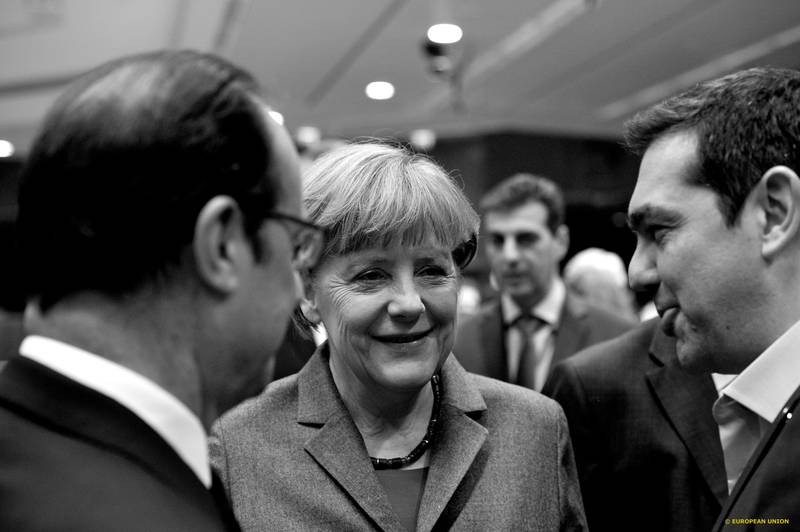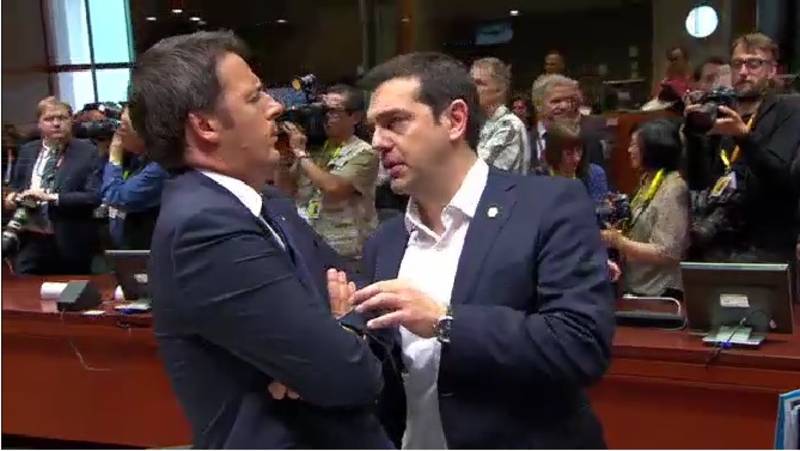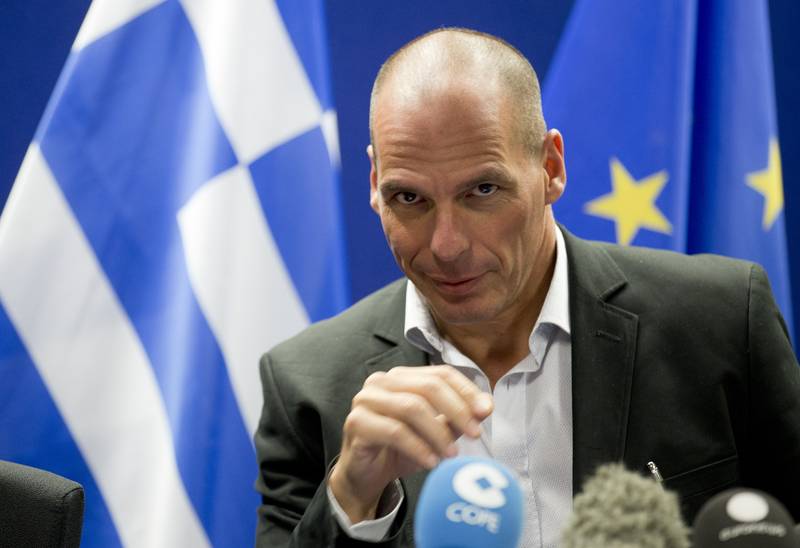Greece in Quick Sands: Germany's Crusade against Populism in Europe
Liubomir Topaloff, July 1, 2015
 In the analysis of the current Greek row with the country’s creditors, and of its inimical relationship with the EU as a whole, one must differentiate between the process and the action, if it were not to “throw the baby out with the bathwater”. The negotiations with the government of the populist SYRIZA party, in conformity with the expectations since the beginning of the year, when the party won landslide snap elections on a wildly populist anti-austerity, anti-IMF, anti-immigration, and largely anti-EU platform, have now reached, not surprisingly, a dead end. For the past few months the negotiations have followed the example of a textbook strategy: a form of chicken game, where the winning strategy seems to rest on the use of credible threat in order to convince your opponent in the presumed rationality to choose the lesser of two evils.
In the analysis of the current Greek row with the country’s creditors, and of its inimical relationship with the EU as a whole, one must differentiate between the process and the action, if it were not to “throw the baby out with the bathwater”. The negotiations with the government of the populist SYRIZA party, in conformity with the expectations since the beginning of the year, when the party won landslide snap elections on a wildly populist anti-austerity, anti-IMF, anti-immigration, and largely anti-EU platform, have now reached, not surprisingly, a dead end. For the past few months the negotiations have followed the example of a textbook strategy: a form of chicken game, where the winning strategy seems to rest on the use of credible threat in order to convince your opponent in the presumed rationality to choose the lesser of two evils.
And on assigning roles: for EU that would be Jean-Claude Junker as the “good cop,” and the German finance minister Wolfgang Schäuble and the IMF Managing Director Christine Lagarde as the “bad cops”, and for Greece Finance Minister Yanis Varoufakis being the “bad cop,” with Prime Minister Alexis Tsipras struggling to fit the role of the “good cop,” often unconvincingly. The bailout Greek referendum (#Greferendum) is just the latest of a long list of “tactic tricks” in the textbook. With both parties calling each other’s bluffs, however, it becomes gradually clearer that Greece and the EU are heading for an even more destructive collision – head on. Grexit is coming, but not yet.
In the recent weeks some commentators expressed diverse and even frivolous interpretations of what is going on. John Weeks, for example, flatly accused the Troika entering in cahoots with Germany and France, conducting faux negotiations and attempting to fabricate a formal mechanism to kick Greece out of the Eurozone and even of the EU, or at best replacing the SYRIZA government “with one obedient to the neoliberal project”. We also heard voices questioning why the focus is on Greece, when the real problem is the creeping silencing of real democracy elsewhere. In particular, the argument was that EU is inclined to tolerate an illiberal semi-authoritarian rule of Victor Orbán in Hungary, who silences opposition and violates human rights, but who also willingly “squeezes a little more” the population in order to meet the “sacrosanct 3% budget threshold” while doesn’t extend a hand to what should amount to an embodiment of a really democratic and popular government, that of Alexis Tsipras, which expresses determination to “take autonomous decisions” and “defend its citizens in case of extreme hardship”. And all this, because EU, or perhaps some sort of cabala elites behind the EU project, wants to send a “chilling message” – submit to, and stray away not, from new neoliberal EU!
Strangely, I find myself partially agreeing with the latter, but not for the reasons argued above. It is about a message alright, but of a different kind. Greece’s economy is small enough for the EU, or even for Germany, with or without the help of the European financial institutions, or other countries to put it on steroids and bring it back to life, if the financial health of Greece, were the only actual reason. In the process there is, of course, a risk to send all the wrong signals to other – much larger countries with far bigger economies – such as Spain and Italy. The moral hazard could be contagious.
Yet, the real reason is not in the risk of mismanaging the financial side of the moral hazard, but of the political one – spreading populism, tsunami style. Spain, Italy, France and Germany are the biggest members of the Eurozone, and also the largest countries in the EU. Increasing groups of citizens there, mostly young voters, are highly dissatisfied with reality, unhappy with their prospects of future, and unaffected by the institutionalised fear and threat of new fragmentation, a major conflict, and even a war, that was characteristic for the post WWII generations in Europe. In the wake of the apparent death of the European myth of “ever closer Europe”, that stitched together a diverse continent with loaded history of animosity for six decades after the Second World War, it is the rise of populism that poses the greatest threat to United Europe today.
In that sense, the recent surge of Euroscepticism must be seen as a symptom of the contagious and destructive force of populism. If in Italy and Spain populist versions of SYRIZA – namely PODEMOS and M5S – follow SYRIZA, one can imagine that from there it will be only a downfall for the European integration, the Eurozone, and not last the EU as currently known. Starting with the Occupy movements, sometimes ago, the populist opposition to the neoliberal direction of European integration now begins to bear fruits, and they promise to be quite sour.
What makes the current populist push dangerous beyond Greek borders is not only the threat of the euro failing, and the Eurozone disintegrating. Europe, not just the EU, is today under an extraordinary attack from abroad, and its borders, just as well as its political cohesion and will are under fire thus generating a momentum for disintegration, if not worse. To the East, the conflict in Ukraine has created the greatest challenge to the post-WWII order in Europe; to the South-East, the never ending tragedy in Syria and the rise of ISIS have generated the biggest humanitarian crisis since the WWII; and to the South, the failing social and economic conditions in Africa, the abject human conditions of a continent torn apart by civil wars, famine, and diseases, have pushed ever greater number of migrants to take unbelievable risk to “live free, or die”.
In the Balkans, the unsettled conflicts in some parts of ex-Yugoslavia, namely Macedonia, Bosnia, Kosovo, Serbia and Montenegro, can loom again any moment now in full force, engulfing the entire region. United States increasingly behaves less as an ally and more as a shogun dispatching its spies across the continents, and trying to pull strings behind the scene. Just look at the latest allegations that NSA spied on French, German, and British leaderships, among other things.
In this context, the epic clash between Greece and the EU is indeed a battle for the hearts and minds of the Europeans. This battle is fought as a process in which the populist politics are revealed for what they are – calls of Sirens that are as seductive, as they are also deadly. During moments of crisis, populists lure voters with promises for easy solutions to complex problems; they antagonise socially and politically the society, introducing culture of intolerance, and engage in splitting the society in a Manichean way to “pure people”, that is the “victims” and “evil elites”, that is the traditional corrupt establishment, while in the process they also instill a sense of nationalistic indignation. Once this smokescreen is erected, the populists are quick to engage in a rent economy and internal redistribution of goods and services in order to consolidate their core constituents, and heighten intolerance against any opposition of their corrupt political and economic model. At the end,  however, populism always turns out to be impotent, harmful, and most importantly unstable. Its economic model functions like a Ponzi scheme, and collapses like one, too.
however, populism always turns out to be impotent, harmful, and most importantly unstable. Its economic model functions like a Ponzi scheme, and collapses like one, too.
It is precisely through the display of the hollowness of Tsipras's government’s unbound populism and its empty promises that the Troika and Germany are fighting for the preservation of the soul of the European integration project itself. It is hardly more appropriate than here to remind a scene from Thucydides’ Peloponnesian War when Athens sends its flotilla to enslave the small island of Mylos. When the Melians claim that they are not doing any harm to Athens, only keeping neutral the Athenians are quick to point that this is precisely the issue – it is a moral hazard that sends the wrong signal and sets a bad example for others to follow. Examples are contagious. While historical analogs are usually a bad idea the principle of moral hazard remains – Syriza’s wild and unchecked populism sends the wrong signal and sets a bad example for other populist movements in Europe to follow. It is up to Germany and the Troika to prevent the populism spread in Europe.
“Someone who is building a house has not built it”, claimed Aristotle in Metaphysics, Theta 6, by which he inadvertently placed emphasis on the process. And so he also distinguished between a process, such as building a house or learning, and an activity, such as seeing, hearing, or living. For him, it seemed, the process was supposed to lead to an end, but was not the end in and of itself. One cannot judge the result without examining the process, as the outcome inadvertently has acquired specific value on its own through the experience of the process itself. Similarly, the German philosopher Hegel, elaborating on Kant’s idea of “transcendental subject”, saw reality as an aggregated structures, or begriffe, the dynamic contrast and differentiation between which – what he called dialectics – results in productions. In short, productions are processes with a specific product or result in mind, during which the end product is shaped. Semantically, product and process may seem two separate entities, however, hermeneutically, they are two elements of the whole, and as such share the value. Like in the case of an artifact, be that a statue, a painting, or for that matter a policy of austerity.
For Angela Merkel’s government the Greek crisis is a process, from which will emerge a product. This product has at least three dimensions: stabilizing the Euro; curbing the rise of populism; and establishing a multi-zone EU with concentric circles encompassing each other as layers of an onion, so that the process of disintegration goes the reverse way, and eventually be stopped at some level. Grexit may not be the preferred option for the Troika but Germany seems prepared to sacrifice Greece as a matter of opposing the tidal wave of populism that is overcoming the rest of Europe. The Government of Angela Merkel also seems to believe that Grexit will strengthen the euro. The Troika, on the other hand, has little options but to stay firm to the financial principles. It has repeatedly claimed that austerity and fiscal discipline are the founding principles of the Eurozone, and now it has to prove it right, or risk a domino effect. So, the question is not whether Greece will leave the Eurozone. Sooner rather than later this will inevitably happen – be that next week, or next year. It is a matter of how. Judging from the recent developments, one my say that it will happen in the worst possible way, in a nasty divorce that will resemble the nasty scenes from the Roses war movie.
There are going to be no winners in this. In the process of winning the hearts and minds of the rest of EU citizens Germany and the Troika almost certainly will lose the Greeks, or at least the ones, who still prefer staying in the Eurozone. The others never really believed in the EU project and grudgingly accepted the benefits from it. The first category seems to be larger and that is why losing the Greeks is no reason for celebration. According to the latest Alco Poll from June 24-26, about 57% of the Greeks continue to insist on staying in the Eurozone, and only 29% are for rupture. The proposed snap referendum by SYRIZA on the Greek bailout conditions, apart from the fact that is rather unconstitutional since the Greek constitution does not foresee the possibility of conducting plebiscites on fiscal matters, is also a bad way of conducting politics. It is also the worst possible way to spend 110 million euro of precious cash, instead of investing it in social programs. True, The Financial Times leaked a version of the proposed bailout agreement recently but neither this proposal has been made public yet, nor has it been translated into Greek – two preconditions for the basic information needed by the voters to cast opinion on the matter.
And, the question how one organizes a referendum in a handful of days remains open. The majority of the honestly worried pro-European Greeks, unfortunately, are left at the mercy of Syriza and its unnatural coalitional partner ANEL, and their agents, to be informed and form an opinion that would ultimately shape their political attitudes. Since Syriza came to power almost half a year ago, it managed to establish a firm control over the major media outlets, following a sweeping politically motivated lustration. Therefore, the referendum that is scheduled in a record short time will be essentially one very expensive poll on the ability of the populist government in Athens to heighten the fears of the ordinary Greeks into a perverse version of what Finance Minister Varoufakis praised in a recent tweet as an act that may sound “radical” but in his own words will “boost democracy” all over in Europe. His argument, of course, is making an implicit claim that the government has no mandate to accept the requirements of the Troika, as it only has 41% support in the elections, and therefore will have to ask the “demos” again. Being an unscrupulous populist though, he and his boss, Mr Tsipras,  both had no problem speaking “for all Greeks” in the past, in congruence with the best practices of populism.
both had no problem speaking “for all Greeks” in the past, in congruence with the best practices of populism.
Regrettably, Syriza’s move for a referendum is an expensive exercise of populism in a country badly deprived of funds. But it will be also a perfect negative example for the rest of Europe of how someone that finds himself up to his neck in quick moving sands should not move a lot but try to hold on to the straw that a bystander has extended to him. And be grateful for that. This outcome is exactly what Angela Merkel and Wolfgang Schäuble seem to want. What they know, and Tsipras is about to learn the hard way, is that once the person in the quicksand is being pulled out of it only then he should be at the liberty to seek responsibility and assign blame, the populist way. But then again, his credibility with the constituents will be irreversibly gone. It is a simple matter of pragmatic prioritisation that is a hallmark of mainstream rational politics, Machiavellian way. But is also a principle that doesn’t bind well with populism and its pitfalls. Because the greatest strength of populism is also its greatest weaknesses – its legitimacy and success rest on the ability to deliver. Populism is bound to fail on that. After all, how exactly do you deliver an imagined, deceitful political chimera?
Liubomir Topaloff, Associate professor of politics at Meiji University, Tokyo, is author of Political Parties and Euroscepticism (2012)
 Klaus Regling | © Council of the EU
Klaus Regling | © Council of the EU Mario Centeno | © Council of the EU
Mario Centeno | © Council of the EU Mario Centeno | © Council of the EU
Mario Centeno | © Council of the EU